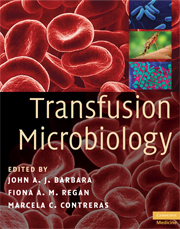Preface
Published online by Cambridge University Press: 12 January 2010
Summary
Prior to the early 1970s infections transmitted by transfusion were relatively common. In developed countries the introduction of routine screening for hepatitis B virus infection marked the beginning of the recognition, and implementation of systematic measures to reduce the risk from transmission, of viruses by blood transfusion. Currently, extensive measures are taken in many countries to ensure that blood transfusion poses a minimal microbiological hazard to recipients. Continual refinements to donor selection criteria, microbiological testing, technologies, processes such as leucodepletion, viral inactivation and associated quality management systems seek to improve the safety even further, yet there is a diminishing safety yield for ever escalating costs with each new intervention. In less affluent countries, the level of risk from transfusion-transmitted infections is often undetermined and there is a chronic insufficiency of blood donors. The few donors available may well be non-voluntary and this adds to the potential risk from transfusion infections. Fortunately, progress is being made in several regions in establishing voluntary, non-remunerated, blood donor panels. So what does the future hold in the field of transfusion microbiology?
Inevitably, ‘new’ infectious agents will emerge that are potentially pathogenic, which will have to be assessed in terms of the degree of risk to recipients of blood. The way in which these risks are addressed will continue to evolve. Available options for prevention of transmission will have to be assessed not only in terms of efficacy but also in terms of cost-effectiveness and, in many countries, prioritized against other demands for health care resources.
- Type
- Chapter
- Information
- Transfusion Microbiology , pp. xv - xviPublisher: Cambridge University PressPrint publication year: 2008



